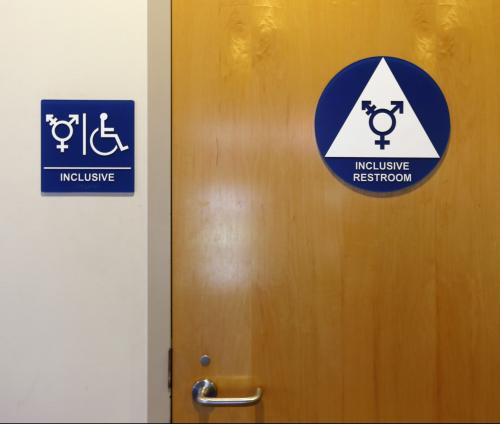On the always contentious subject of LGBT issues, both parties’ 2024 platforms are significant—one for what it contains, the other for what it omits.
The Democrats’ 2024 platform looks much like the 2020 version. Written before Vice President Harris replaced President Biden at the top of the ticket, and approved without significant revision, the 2024 document declares: “President Biden is committed to leading the most pro-equality administration in history.” It boasts that Biden signed the Respect for Marriage Act (recognizing same-sex marriage in federal law), reversed former President Trump’s ban on military service by transgender Americans, pardoned service members who were punished by the military for their sexuality, ended the Food and Drug Administration’s ban on blood donations by gay and bisexual men, protected gender-affirming health care, and more.
Also as in 2020, the 2024 platform pledges to pass the Equality Act, a bill that would extend federal civil rights protections to LGBT people that has passed the House but stalled in the Senate; to protect the rights of LGBT adoptive and foster parents; to restrict so-called “conversion therapy” and expand mental health and suicide prevention efforts targeting LGBT people; and to fight “hate-fueled” violence.
Among the most controversial issues in the culture wars is the provision of “gender-affirming” medical treatment to minors, which U.S.-based pediatric medical associations say is medically necessary but which some countries in Europe have backed away from. Half the states, most of them Republican-led, have banned or restricted such procedures. The Democratic platform does not shy away from this issue, promising that “Democrats will vigorously oppose state and federal bans on gender-affirming health care and respect the role of parents, families, and doctors—not politicians—in making health care decisions.”
All in all, the platform extends and renews promises the party made to LGBT Americans in 2020—and, in doing so, consolidates the party’s repudiation of its checkered past on LGBT issues. Only a few years ago, the party handled LGBT issues cautiously and often, for LGBT advocates, disappointingly. President Bill Clinton signed the anti-gay-marriage Defense of Marriage Act in 1996, and candidate Barack Obama opposed same-sex marriage in 2008. Today, on LGBT issues, there is little daylight between the Democratic Party and its progressive wing.
By comparison, the 2024 Republican platform has little to say on LGBT issues and that is, in itself, a significant change for the GOP. In fact, it devotes only a few sentences to the subject, and those are confined to the “T” (transgender) portion of the debate. It promises to “defund schools that engage in inappropriate political indoctrination using federal taxpayer dollars,” including “gender indoctrination”; it likewise promises to “end left-wing gender insanity” by keeping men out of women’s sports, banning taxpayer funding for sex change surgery, and stopping taxpayer-funded schools from promoting gender transition.
On “L,” “G,” and “B” issues (lesbian, gay, and bisexual), the platform keeps a silence that speaks volumes. The 2016 platform vigorously condemned same-sex marriage, promised to defend marriage “against an activist judiciary” and said, “Our laws and our government’s regulations should recognize marriage as the union of one man and one woman.” By contrast, here’s everything the 2024 platform has to say about marriage (the GOP skipped writing a platform in 2020): “Republicans will promote a culture that values the sanctity of marriage, the blessings of childhood, the foundational role of families, and supports working parents. We will end policies that punish families.” Nothing about or against same-sex marriage.
What’s the reason? The party follows Donald Trump; and he, while no friend of transgender Americans, has never been inclined to attack gays and lesbians, even though LGBT groups have vehemently criticized him. Less than a week after the 2016 election, he repudiated his party’s platform by telling an interviewer he had no problem with same-sex marriage. More recently, in 2024, Melania Trump held two fundraisers for the Log Cabin Republicans, an LGBT Republican group. In the pre-Trump era, those actions would have brought a rain of brickbats down upon a Republican presidential candidate.
Charles Moran, the Log Cabin Republicans’ president, may have overstated the case when he said, “This platform is welcoming, it’s inclusive, this is the most radical and revolutionary way to make the Republican Party competitive in many years.” But he was not off the mark. Although the culture war over gender identity continues, the GOP has waved the white flag on marriage. It is a sign of Trump’s transformational influence on the GOP that today, on the most controversial LGBT issue of the past 50 years, his Republicans stand to the left of Barack Obama’s 2008 Democrats.







Commentary
On LGBT issues, both parties move left
September 6, 2024